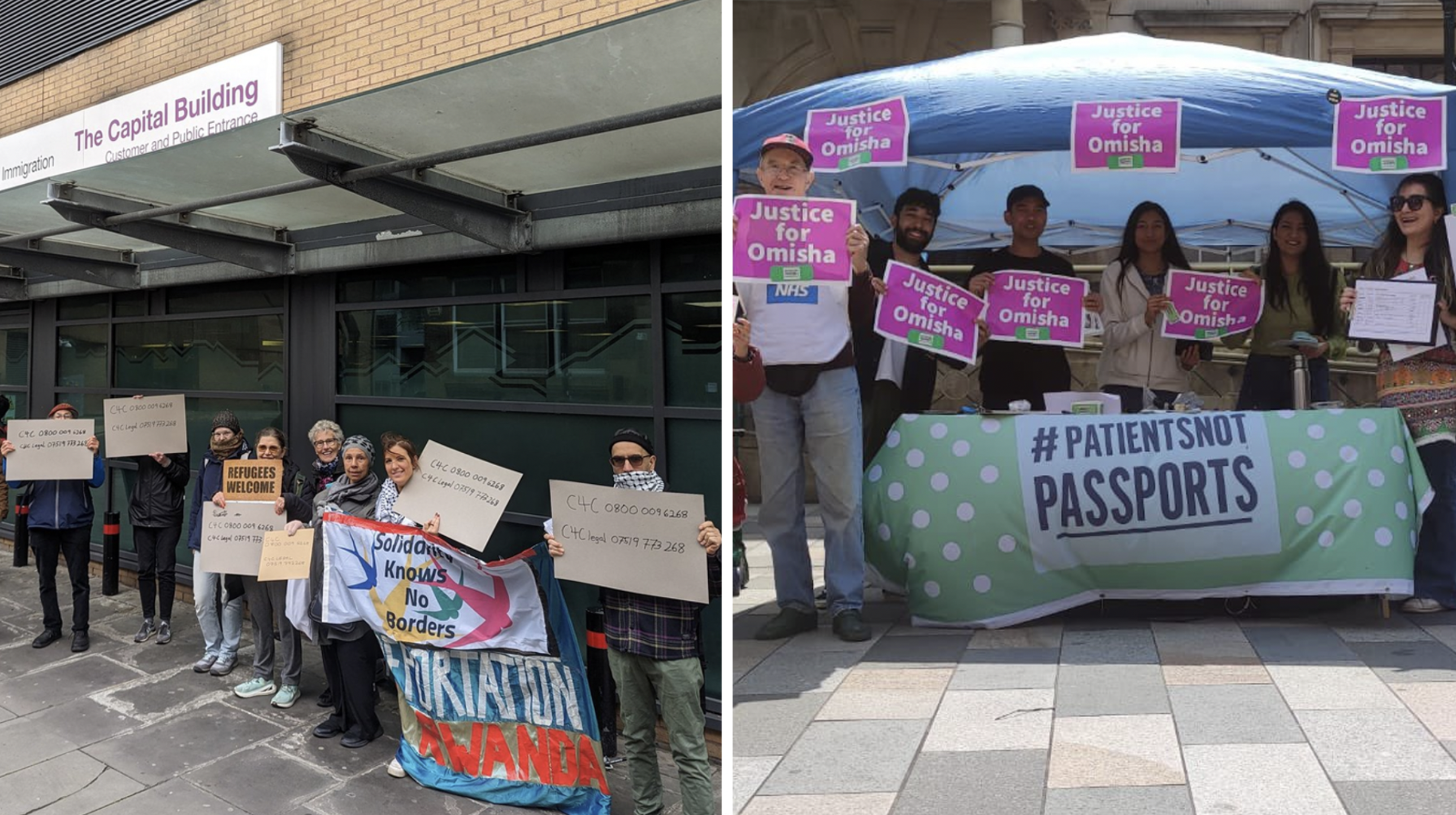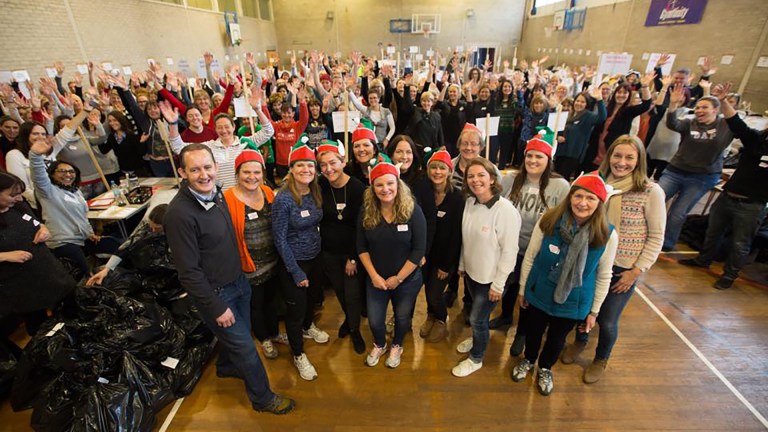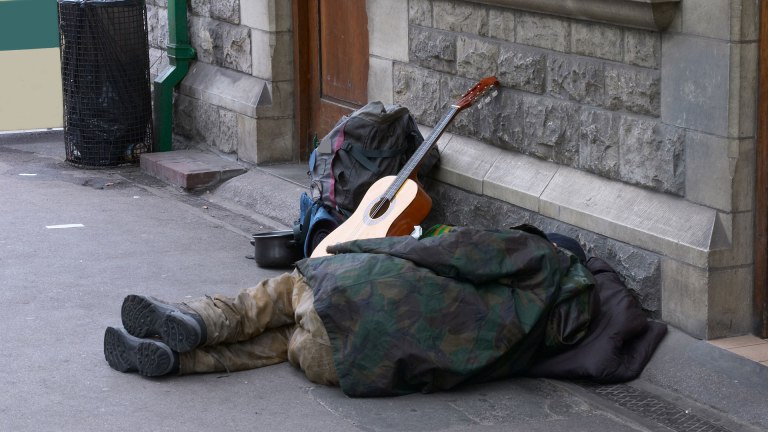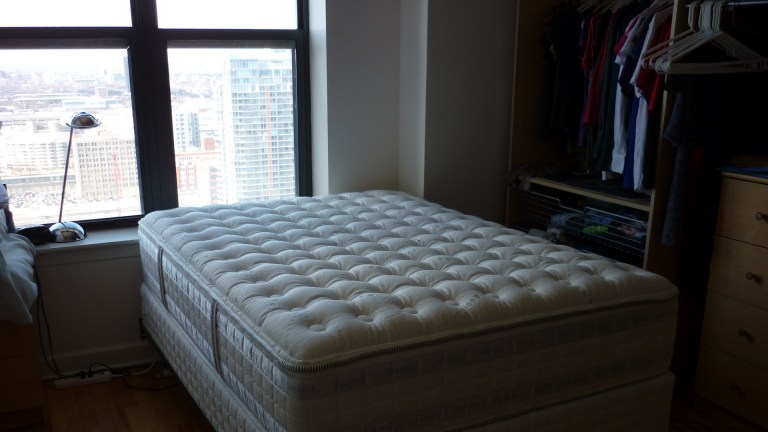Against that context, a group of campaigners decided to raise interest with projects including a film and a play, focusing on the experiences of those who had died and lost loved ones. In 2025, there are plans to tour the play – which received a five-star review in the Guardian – to more than 10,000 people.
3. Mothers Rise Up/Insure Our Future
There’s a lot of money in the climate crisis. Mothers Rise Up has taken aim at the insurance marketplace Lloyd’s of London, trying to stop firms using Lloyd’s from insuring climate-damaging projects. The group’s stunts have included a Mary Poppins-themed flash mob, and a dance outside Lloyd’s London HQ
-
They argue that by facilitating insurance for these projects, Lloyd’s enables their harm to the environment. So far, 12 insurers at Lloyd’s have pledged not to insure the East African Crude Oil Pipeline.
4. LIVE + BREATHE
Marginalised groups in the UK disproportionately suffer from air pollution. It’s a serious issue – 10-year-old south Londoner Ella Adoo-Kissi-Debrah became the first person in the country to have air pollution recorded as the cause of her death.
-
But raising awareness comes in different forms. The collective LIVE+BREATHE are using art and culture to show the impact of dirty air on Black and Brown communities. Their video was shown during Billie Eilish’s gig at the O2, while they believe the arts can be used to spearhead change.
5. Anti-Traveller wide injunction taken to the Supreme Court
Recent anti-protest laws introduced by the Conservative government have also created a more restrictive environment for Gypsy and Traveller communities.
-
In a collaboration between Friends, Families and Travellers, Derbyshire Gypsy Liaison Group, and London Gypsies and Travellers, campaigners challenged the use of wide “persons unknown” injunctions against travellers, arguing they prevent the community from living the traditional nomadic way of life. The case resulted in the Supreme Court recognising how injunctions can threaten this way of life, and restricted the use of wide injunctions.
“It is increasingly vital that organisations like us are able to punch above their weight in the legal sphere and be recognised – we hope that this is only the beginning in tackling deeply embedded systemic issues,” said Sarah Mann, CEO of Friends, Families and Travellers.
6. Make Food Waste Count
When the government reneged on a promise to introduce mandatory food waste reporting requirements for businesses, environmental campaign group Feedback took legal action. Steve Barclay, the environment secretary, subsequently promised the government would review the U-turn.
-
“After many years of research, campaigning, and coalition building, it was litigation that finally forced the government to reopen its decision to scrap plans for mandatory food waste reporting for big businesses – a critical first step to tackle the scourge of food waste and climate change,” said Carina Millstone, executive director of Feedback.
7. The Walking Inquiry into immigration detention
Alongside the inquiry into the Brook House immigration detention centre, the Gatwick Detainees Welfare Group began a Walking Inquiry.
-
Culminating in a report launched in parliament, the Walking Inquiry used walks and workshops to help those with lived experience explore the impact of immigration detention.
8. These Walls Must Fall
Long after the “hostile environment” was coined as a term for the UK’s immigration policies, new laws and schemes have abounded, with the Illegal Migration Act and the government’s Rwanda scheme sparking particular resistance.
-
Organised by Right to Remain, These Walls Must Fall puts lived experience at the heart of the campaign, helping communities get together to oppose the hostile environment. Through monthly meetings, they’re helping migrants navigate the immigration system, and build skills.
9. Holding Our Own: non-policing solutions to ‘serious violence’
Rather than granting the police greater powers, the Holding Our Own campaign calls for serious youth violence to be tackled in a different way. Instead of expanded stop and search and continuing unfair treatment, they want more funding and support for young people. Part of this approach includes an end to drugs policing, and removing police from schools.
-
The campaign is a collaboration between groups including Liberty, and has produced a guide to how their aims can be achieved. They hope this can break a cycle, and “move away from policing as a response to social problems”.
10. Save St Mary’s Primary School Fivemiletown
In 2023, St Mary’s Primary School Fivemiletown, a school for 42 children in rural Northern Ireland, was earmarked for closure. Parents got together and fought back, as campaigners said it would remove education options for Catholic children in the area.
-
They won: the closure of the school was reversed, and enrolments have even increased.
11. Free Bus Travel Campaign
While they wait for a decision on their claim, asylum seekers are prevented from working and given a small allowance. Many report difficulties in getting to appointments, or accessing medical care as a result. Highlighting the experiences of those in the asylum system, the Free Bus Travel Campaign pushed the Scottish government to provide free bus travel for asylum seekers.
-
In November 2023, it became a reality, with Holyrood committing £2m in funding. It’s even sparked similar campaigns south of the border, including one in London which the Big Issue has reported on.
12. London Loos
Access to toilet facilities is a human right. But public toilets in the UK are in decline, with hundreds disappearing over the last decade. Led by Age UK, activists have been pushing London councils to reverse this trend, pushing council leaders to agree new plans for loos. Their victories include making Islington Council provide a hard-copy map of loo locations, available in libraries.
-
13. Sustainable Farming Campaign
Farming in the UK is changing. As we’ve reported, climate change is making producers adapt, and threatening a stable income. But a narrow supply chain means farmers can often have little choice or security.
-
The Sustainable Farming Campaign has forced Jacob Rees-Mogg to clarify comments on Somerset residents preferring hormone-injected Australian beef, and with an 11,000-strong petition in its back pocket is getting politicians to agree to the need for supply chain reform.
14. Fawcett Society vs The Sun
IPSO, the press regulator introduced in the wake of the Leveson Inquiry, had never upheld a complaint about sexism. That changed when the Fawcett Society, a small charity with fewer than 10 staff, brought a complaint against The Sun over Jeremy Clarkson’s controversial column about Meghan Markle, where the former Top Gear presenter spoke of a “hate” for Markle on a “cellular level”. Clarkson blamed a clumsy reference to Game of Thrones and a hastily-filed piece of copy, apologising a month after publication.
-
But IPSO found the column had discriminated against Markle on the basis of her sex, and the complaint resulted in a front page apology from The Sun.
15. The Justice for Omisha Campaign
Imagine your 10-month-old daughter gets diagnosed with cancer, but then the NHS steps in and saves her life with a liver transplant and chemotherapy. What should have been relief for Omisha Shrestha’s parent’s ended up with a £76,000 bill and debt collectors turning up at their door – all because of their immigration status.
-
Omisha’s parents went on to campaign for an NHS that is free for all, with wins including the CEO of the NHS trust which sent the bill agreeing to wipe out the debt and review its charging policy. Crucially, he gave officials the power not to pursue inappropriate debts. Now, the Justice for Omisha Campaign wants to keep pushing and spread this approach wider.
16. #CrimeNotCompliment campaign
Public sexual harassment has become a specific criminal offence in the UK, thanks in part to the campaigning efforts of Our Streets Now, led by sisters Gemma and Maya Tutton.
-
The pair used art, illustration and petitions to raise the profile of the issue. It resulted in the Protection from Sex-Based Harassment in Public Bill becoming law in 2023, but they continue to work in schools and universities to push for wider cultural change.
17. Josie Argyle
Injunctions have been used to imprison climate protesters across the UK: from Insulate Britain activists to Just Stop Oil members. Before part of it was cancelled, the HS2 high-speed train line was covered by an injunction preventing trespass. Step in activist Josie Argyll, who developed a toolkit to help campaigners understand how these legal instruments can affect their right to protest. She also supported those imprisoned for breach of injunction.
-
“Injunctions have increasingly been used by both the government and private corporations to suppress dissent. By exploiting this lesser understood form of prosecution to protect private interests, they are completely disregarding and silencing the communities their practices most affect,” says Argyle.
18. The Care Experienced Movement (CXM)
The first movement of its kind for the tens of thousands of care leavers in the UK, the Care Experienced Movement fights for policy change, shows the range of experiences within the care system and puts the voices of care experienced people at the heart of the debate.
-
After becoming a Community Interest Company in 2023, the organisation is working towards organising a Care Experienced Rally in 2025.
19. Andy Soar – Nope to Hope: Scrap hope value to build social housing
One barrier to building enough social housing in the UK is the little-known wheeze “hope value”. Councils are forced to pay sums, often tens of thousands, above the odds for land, based on what it could be worth if it’s developed in the future.
-
Campaigner Andy Soar joined forces with Shelter to try and change this. Progress has been made: at the end of April the government announced hope value will be scrapped in certain circumstances, a change described by levelling up minister Jacob Young as a “catalyst for investment in our towns and cities”.
20. Dr Kush Kanodia – Eco Ableism – Disability Discrimination from London’s Ultra Low Emissions Zone (ULEZ)
The expansion of London’s Ultra Low Emissions Zone proved controversial, with elections being fought on the topic and vigilantes destroying its cameras. But it also had the potential to disproportionately affect disabled people in the capital who rely on their cars.
-
Seeking “reasonable adjustments” to the scheme, Dr Kush Kanodia led a campaign to change the low-emissions zone. He met with mayor Sadiq Khan, who ended up introducing £10,000 grants for wheelchair accessible vehicles and an exemption for 250,000 disabled people.
21. Miss J – End Sexual Misconduct in Sport
Determined to end rape culture and sexual misconduct in Scottish sports, the anonymous Miss J set out on a mission. There is a culture, she says, “that perpetuates sexual violence through silent complicity – even at times overlooking serious transgressions in favour of skill”.
-
She’s been campaigning to make sure sports teams can tackle sexual misconduct, including by introducing sexual misconduct policies and appropriate training. Clyde Football Club were the first to introduce such a policy, in December 2023.
22. Not Just the Ticket
One big factor in the rolling rail strikes of the past few years has been government plans to close ticket offices at train stations. Disabled people have warned that the closures would leave them stranded.
-
Coming together as Not the Ticket, disabled campaigners organised resistance against the change, carrying out a detailed analysis of the consequences, and backing a judicial review. The pressure led to the government extending the consultation, and in the end saw the government back down on the ticket office closures.
23. Operation Noah’s Bright Now campaign
The Church of England’s investments are more controversial than many may realise. Recent headlines have seen the religious body in the firing line for holding a “feudal property empire”, as the battle over leasehold reform rages. But their investments in fossil fuels are unlikely to attract such fervour any more, as in 2023 the church announced it would be completely divesting from the sector.
-
This had been a decade in the making, thanks to Operation Noah’s Bright Now campaign. Now just two-score CofE dioceses are still invested in fossil fuels, with hundreds of millions moved into sustainable investments instead.
24. Campaign for a suicide-safer internet
Spearheaded by Samaritans, the campaign to make the internet suicide safer managed to push through changes to the government’s Online Safety Act. Internet content can play a powerful role in suicides, and the charity.
-
By lobbying MPs and peers, Samaritans helped introduce major changes, so that in the end the bill legislated platforms to remove online access to suicide and self-harm content, and introduced a new offence of maliciously encouraging or assisting self-harm.
25. Honesty in Politics
Some politicians lie to parliament deliberately. Others “inadvertently mislead”. For those who wished to correct Hansard, the official record, there was no easy way to do so.
-
Fact-checking organisation Full Fact campaigned to change this. Thanks to the campaign, MPs who wish to can now update the record to reflect the facts.
26. Citizens Advice calls for forced prepayment meter installations to stop until new protections brought in
The forced installation of prepayment meters has become a national scandal since the Big Issue first reported on it back in 2022. The emergence of the scandal prompted Citizens Advice to campaign, and led to a pause in the installation of new prepayment meters.
-
27. Family Discrimination in Renting
Renting in the midst of the housing crisis can be a nightmare, but especially so when you have children – as Lexi Levens found when she received a Section 21 eviction. Landlords and letting agents were refusing to rent to her, as she had children. So she decided to take the case to tribunal.
-
Her victory saw the Property Ombudsman rule that anybody refusing to rent to children for no reason was discriminating against them, with landlords now prevented from having blanket “no children” bands.
28. Don’t Cut the Card
The Day Travelcard offers the ability to get around London for a single day with a single ticket. But its future was under threat in 2023, posing a risk for those with disabilities, or who don’t have contactless.
-
The Campaign for Better Transport stepped in to try and save it, and succeeded. A blitz of lobbying, media, and engagement followed. In October 2023, Transport for London backed down and the card was saved.









